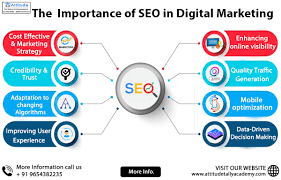How to Start an SEO Campaign for Your Small Business
In the digital age, having a solid online presence is crucial for small businesses looking to attract customers and grow. Search Engine Optimization (SEO) is one of the most effective ways to improve your visibility in search engine results, drive organic traffic, and ultimately increase sales. If you're ready to start an SEO campaign for your small business, here’s a step-by-step guide to help you get started.
1. Understand Your Audience and Goals
Before diving into SEO, it's essential to understand your target audience and define your campaign goals. Ask yourself:
- Who are my ideal customers?
- What problems do they need solving?
- What keywords are they using to search for products or services like mine?
Having a clear understanding of your audience will help you tailor your SEO strategy to meet their needs and preferences. Additionally, set specific, measurable goals for your campaign, such as increasing website traffic by 30% over the next six months or ranking on the first page of search results for specific keywords.
2. Conduct Keyword Research
Keyword research is the foundation of any successful SEO campaign. Use tools like Google Keyword Planner, SEMrush, or Ahrefs to identify relevant keywords that your audience is searching for. Look for:
- Keywords with a good search volume and low competition.
- Long-tail keywords that are specific and relevant to your business (e.g., "best coffee shop in [your city]").
Create a list of primary and secondary keywords to target throughout your website and content.
3. Optimize Your Website
Once you have your keywords, it’s time to optimize your website. This includes:
- On-Page SEO: Incorporate your target keywords into important elements like page titles, headings, meta descriptions, and throughout the content. Make sure to maintain a natural flow and avoid keyword stuffing.
- Technical SEO: Ensure your website is fast, mobile-friendly, and easy to navigate. Optimize your site’s structure by creating a clear hierarchy, using descriptive URLs, and implementing schema markup to help search engines understand your content.
- Content Quality: Create high-quality, valuable content that addresses your audience's needs and interests. Regularly update your blog or resource section with informative articles, how-to guides, or industry news that incorporates your keywords.
4. Create and Optimize Local Listings
For small businesses, local SEO is vital. Claim and optimize your Google My Business (GMB) listing to improve your visibility in local search results. Include:
- Accurate business information (name, address, phone number).
- Business hours, website link, and a brief description.
- Photos of your business and services.
Encourage satisfied customers to leave positive reviews on your GMB listing, as reviews can significantly impact your local search rankings.
5. Build Quality Backlinks
Backlinks (links from other websites to yours) are a key factor in improving your search engine rankings. Focus on building high-quality backlinks by:
- Guest Blogging: Write articles for reputable blogs in your industry and include links back to your website.
- Networking: Connect with local businesses or influencers and collaborate on projects or promotions that can lead to backlinks.
- Creating Shareable Content: Produce unique, valuable content (like infographics, videos, or industry reports) that others will want to link to.
6. Monitor and Analyze Your Performance
Once your SEO campaign is underway, it's crucial to track your performance. Use tools like Google Analytics and Google Search Console to monitor key metrics, including:
- Organic traffic and user behavior.
- Keyword rankings and impressions.
- Conversion rates from organic traffic.
Regularly analyzing your performance will help you identify areas for improvement and adjust your strategy accordingly.
7. Stay Updated on SEO Trends
SEO is an ever-evolving field, and staying informed about the latest trends and algorithm updates is crucial for maintaining your rankings. Follow reputable SEO blogs, attend webinars, and participate in online communities to keep your knowledge fresh and relevant.
Conclusion
Starting an SEO campaign for your small business may seem daunting, but with a clear strategy and consistent effort, you can achieve significant results. By understanding your audience, conducting thorough keyword research, optimizing your website, and continuously monitoring your performance, you'll be well on your way to improving your online visibility and driving organic traffic. If you need assistance in implementing an effective SEO strategy, consider partnering with a digital marketing agency like Vocation Marketing to help you navigate the complexities of SEO and achieve your business goals.

